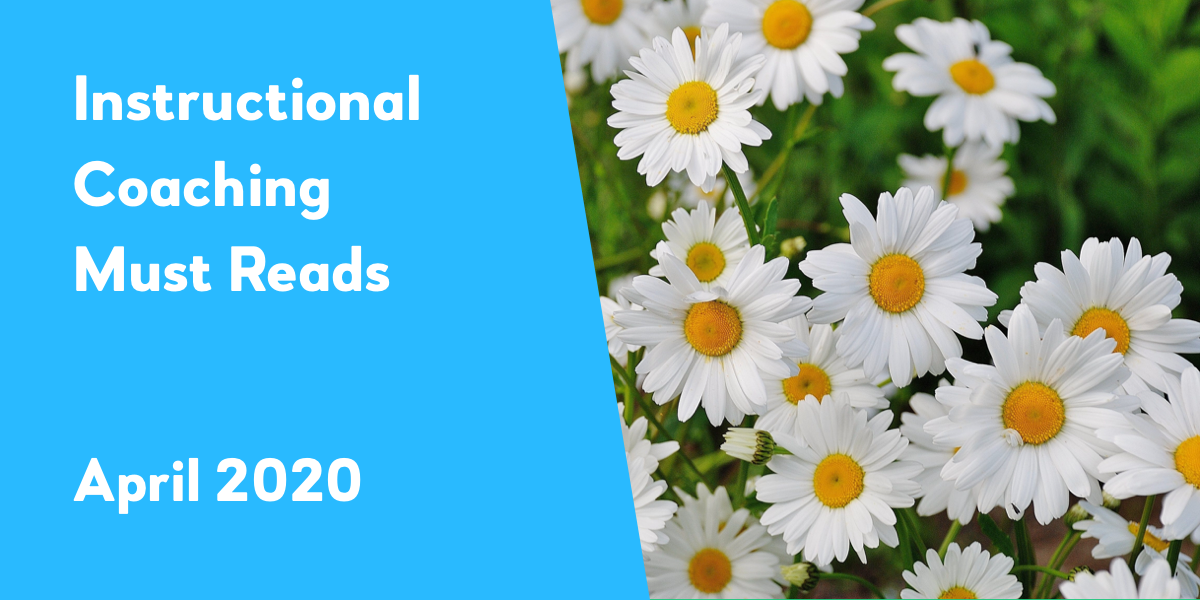


April’s Weekly Coaching Roundups offered a bundle of fresh articles that we picked just for you! Read below to learn the best of the best on remote coaching, staying connected with teachers in new digital ways, keeping your sanity while working from home, the importance of affirmation, and more. Enjoy!
Tired of waiting until the end of the month to read your coaching news? Join our weekly coaching roundup to get these sent directly to your inbox every week!
{{cta(’91e39d53-f5a0-42e6-8226-06f568821405′,’justifycenter’)}}
3 Quick Tips for Remote Coaching
TeachBoost’s own, Dave Reid, provides a few ways for coaches to support teachers during their distance learning transition, and how TeachBoost Coach can help.
“Educators are being flooded with new tools and practices right now. . . . With so many new tools being introduced, you might notice there’s a large influx of teachers who have questions and need your support.
You can use informal coaching to quickly share a resource, schedule a meeting, add evidence and more, without needing to set a goal for them first.”
5 Tips for Leveling Up as a Coach
Elena Aguilar and Lori Cohen emphasize the significance of continuously mastering your skillset and growing as an IC. Bonus: watch their video for role-play tips!
“There are so many ways to improve your coaching–and just like teaching and leading–the more we can hone our practice, the more skilled we’ll be. . . .
Leveling up as a coach grows your impact.”
Coaching in the Time of COVID-19
Fiona Hurtado reflects on her remote coaching journey so far and how voice notes have helped her to stay engaged with her teachers.
“As teaching moved from classrooms to living rooms, we began to face more personal challenges. . . .
I wanted people to know I was here, managing the day at home and thinking about them. I wanted to do more than say ‘Let me know if there’s anything you need,’ because we are hard-wired to shrug it off politely. I wanted to ask ‘What do you need today?’ ‘How are you feeling?’ and ‘What have you been thinking about?’ It’s exactly how it starts in school after a break—and maybe these things are what matter now more than ever.”
4 Tips for Coaching in Unprecedented Times
Stephanie Affinito offers four ways coaches can support teachers during their transition to a new reality: working remote.
“Classroom teachers are working tirelessly to ensure everyone stays connected and that their students continue to learn amid COVID-19 school closures. They’re gathering resources, connecting with students and other educators online, and rethinking what learning looks like in times of crisis. . . .
During these times, coaches need to reach out to teachers to ensure they’re still heard and seen.”
Manage your coaching cycles online! |
|
TeachBoost Coach helps you manage your coaching cycles, goals, meetings, and evidence online. It works on any device, making it easy to take pictures and videos in the classroom directly connected to your coaching cycles. We’re looking for instructional coaches to pilot the tool and provide feedback! {{cta(‘997af1e4-1e4d-4d17-8c80-43a15a5af702’)}} |
Rules for Surviving Remote Learning
Pam Hubler provides five ways to stay sane while working from home.
“When I’m home, it’s much harder to keep up with time.
I need my digital reminders so I don’t miss any important meetings! . . . Things are changing so quickly right now, you don’t want to stress yourself out by planning too far ahead and realizing those plans have to change.”
The Power of Affirmation
Jenna Moller shares why affirmation is important—both in our personal and professional lives—and how taking a moment to acknowledge others every day fosters strong coaching relationships.
“This profession is tremendously rewarding and challenging at the same time, making it crucial to affirm others in small ways to ensure teachers feel appreciated and connected—and remain in the classroom. . . . I leave these affirmations in mailboxes, on computers, or hand-deliver them depending on the teacher’s schedule.
Teachers continue to partner with me with the desire to learn and grow
because of the positive relationships built on affirmation.”
Distance Vs. Classroom Coaching
Steve Barkley explains the importance of vulnerability and trust in a relationship between teacher and coach.
”
Building trust increases vulnerability. Crisis creates vulnerability. People will respond to that vulnerability by either stepping forth and welcoming (even requesting) input from others or pulling back seeking safety in being invisible. . . . An empowered teacher who senses autonomy is more open to vulnerability.”
Fostering Connectedness during Remote Learning
Kim Cofino passes along six tips from coaches around the world for supporting teachers with remote learning.
”
One thing all coaches can do, regardless of circumstance, is be a human connection, personalized social support, a caring listener, and help educators focus on their overall wellbeing, mental health and ability to cope with the world right now. . . . This gives us a great opportunity to not only support our colleagues in the ways that are most relevant and useful to them, but also advocate for their needs with our school leadership team.”
Bonus Articles on Remote Coaching and Teaching
Did you miss our Weekly Coaching Mega Roundup for April? If so, or you’d like a quick refresher, here’s the link to some great insights on remote work and distance learning for both teachers and coaches! Don’t forget to share with your peers.
{{cta(’34b13594-505a-497a-8a75-16ae35acf14d’)}}
Have some interesting instructional leadership news?
Share it with TeachBoost and we’ll highlight it here.
Stay Connected
News, articles, and tips for meeting your district's goals - delivered to your inbox.








